QuestionQUESTION: Hi Carol,
We recently adopted a jrt and char pei puppy mix. It is very aggressive toward my children, especially my 2 year old. Constantly lunging at her and biting her. My children at times are afraid to play with him because of the fear of getting bit. We've tried the yelp and walk away, pennies in a can, isolation. It's getting a little better but still is a problem. Will obedience classes help with this bad manner. He is usually good obeying myself and husband so he definitely knows the ranking of the family. How long should it take before this biting and lunging stops.
ANSWER: Hi Karen,
Absolutely positively without a doubt you need to take him to obedience classes. Unfortunately he sees your two year old as a playmate or "equal" and he is going to get a lot bigger faster than she is. You need to teach him that NO aggression WHATSOEVER is acceptable. There are games that kids play with dogs like tug-of-war that only encourages more aggression. I think the whole family will benefit from the classes. Very best of luck!
---------- FOLLOW-UP ----------
QUESTION: Thank you so much for your quick reply, I will certainly look into an obedience class. In the meantime, can you give me some examples of what we can do to let Biscuit know that it is unacceptable to bite and lunge.
AnswerHello Karen,
The trick would be to stop him BEFORE he bites or lunges.
You'll have to supervise him at all times when he is with your 2 year old or any of your children. I would leave a training leash on him at all times and the second you see him start toward her you need to pull him back and use a verbal command/sound that breaks his concentration of wanting to lunge or bite.
There is a Cesar Milan technique of correcting him with a "poke, firm squeeze and verbal sound" that simulates a mother dog correcting her puppy. You have to teach him that YOU are the pack leader, the boss. When he is calm, walk him calmly over to her and make him stay still while she pets him - and praise him for his good behavior. This is just a very simplified explanation and I still think a professional trainer will do a lot of good. Here is an article that might help you teach the kids HOW to play with the pup that should be very helpful. Good luck.
PUPPY PLAY
Playing with a puppy is more than great fun. How you play can affect your puppy's future behavior. Your job is to sort out the games that will help your puppy's training and avoid those that may create behavior problems as your puppy matures.
If you or family members play tug-of-war with your puppy, you are playing an aggressive game that fosters competition between the puppy and its owner. Tug-of-war gives your puppy the opportunity to establish dominance. Many puppies use the same tearing action with clothing and household items used in tug-of-war. A puppy cannot distinguish between items that are off limits and those that may be used for play.
Children are especially tempted to allow a puppy to play "chase." This sends a signal in direct opposition to "come," one of the most important commands your puppy can learn. If you give the "come" command to a puppy who has been encouraged to play "chase," it may pounce with its front paws, tail wagging as if to say, "catch me."
Some puppies tend to be biters. You are reinforcing this bad habit when you allow your puppy to bite you during play time. Never wiggle your fingers or hand in a teasing way at your puppy or encourage it to attack you. Such "attack games" may seem cute when your puppy is little, but the end result is usually an adult dog who bites.
When your puppy attempts to bite grasp its collar and say NO firmly. If your puppy continues to bite, flick it under the chin by snapping your forefinger off your thumb firmly saying NO, NO.
If your puppy does not stop biting, confine it until it calms down. Resume play later. Biting should never be rewarded. If you continue to play with your puppy after it has tried to bite you, it will think biting is part of the game.
You can turn play time into a fun and a positive learning experience for your puppy. Teach it to retrieve, to play with its toys (only those safe for puppies) and to do simple tricks. Take your puppy for walks. All these activities establish a bond between you and your puppy.
When a puppy jumps on visitors or climbs all over people, this behavior is often dismissed as "friendly as a puppy." However, climbing and jumping are not friendly or cute as a puppy matures. Teach your puppy to sit when someone enters your house. When it responds to the "sit" command, reward it with lots of praise.
Whenever you give a command, maintain eye contact and remember the importance of your tone of voice. Do not laugh at a misdeed as you say "no" or add in an amused tone of voice comments like "such a naughty puppy."
It's essential that all family members work together to help your puppy establish good habits. Every family member should use the same commands spoken in a firm, no-nonsense voice. If each family member uses a different command, your puppy will become confused.
After a puppy is at least six months of age, attending obedience school is a good idea. Even if your puppy is well-behaved, its good behavior can be reinforced through obedience classes. If you are having training problems, professional trainers can help you gain control of your puppy as the first step toward solving these problems.
Obedience classes are offered by many organizations such as humane societies, kennel clubs and community colleges. You can also ask your veterinarian to recommend an obedience school.
The classes are usually for a 10- to 12-week period. Enroll your puppy when you have time to work with it between classes. This "homework" reinforces what it has learned in the previous class.
Be mindful that obedience school is for you as well as your puppy. To be successful, obedience training should continue after your puppy "graduates" from school. Use the commands it has learned at school and reward it only for positive responses. Enlist the assistance of all family members in being consistent with the commands you and your puppy have learned.
A final thought
As you play with your puppy, ask yourself, "What kind of behavior patterns am I creating? Will they be acceptable as my puppy matures?" The best time to stop bad habits is before they start.

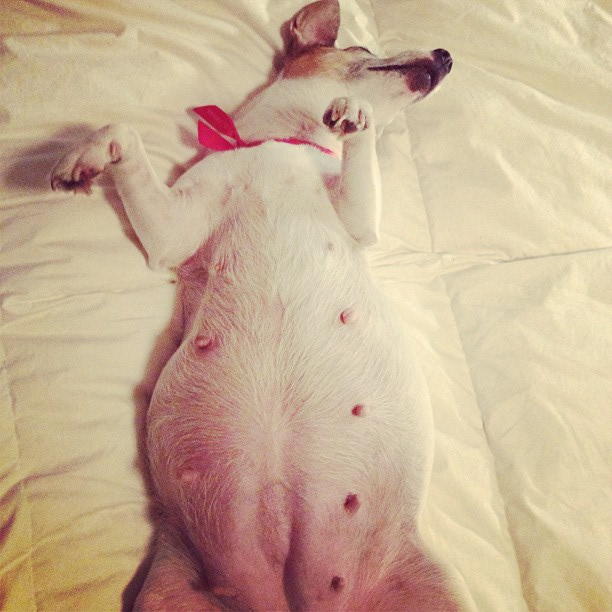 adopted a senior jrt who is pregnant??
Question
Sophie
Found you on google and was hopi
adopted a senior jrt who is pregnant??
Question
Sophie
Found you on google and was hopi
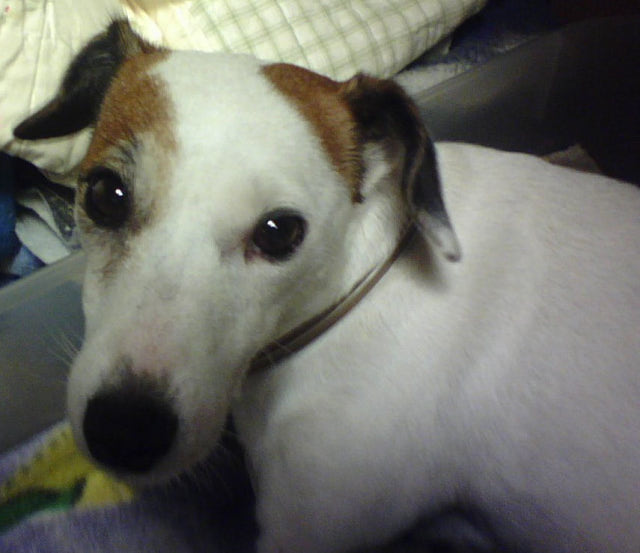 JRT heat cycle
QuestionQUESTION: Hello and thank you for taking the ti
JRT heat cycle
QuestionQUESTION: Hello and thank you for taking the ti
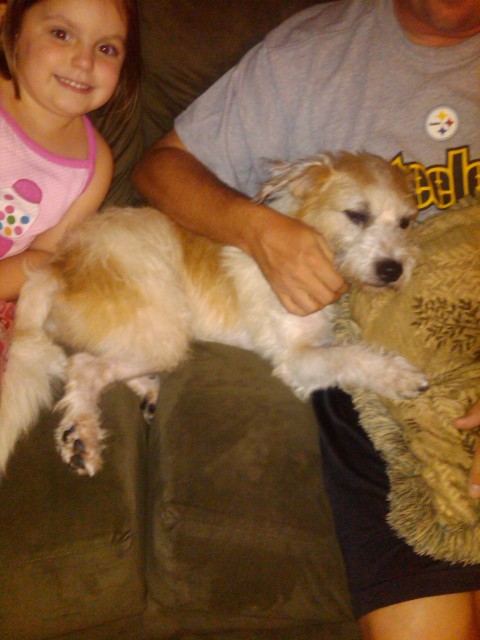 My Rescued Jack Mix
Question
Oliver
Hello Carol!
I am thrilled to see there
My Rescued Jack Mix
Question
Oliver
Hello Carol!
I am thrilled to see there
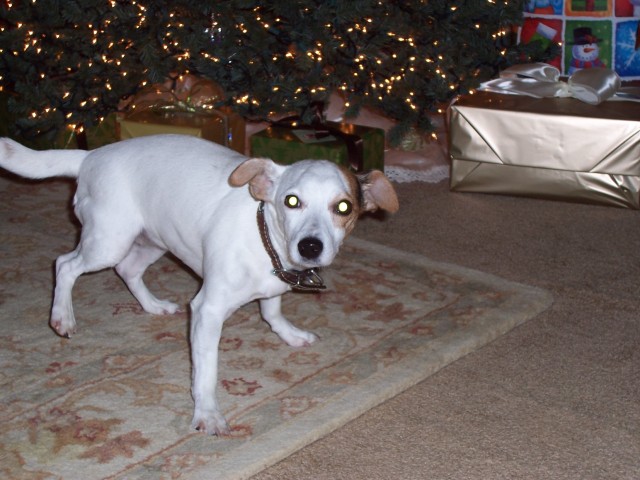 Jack Russell w/ Equiliberum problem
Question
Suzy Q
I have a 10 year old JR who has not bee
Jack Russell w/ Equiliberum problem
Question
Suzy Q
I have a 10 year old JR who has not bee
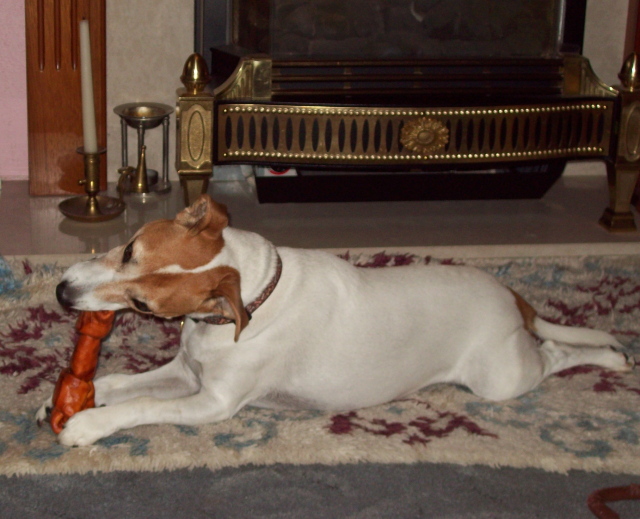 Parson Jack Russell Terrier bitch
Question
Pippa
My PJR bitch was 5 last December. She ha
Parson Jack Russell Terrier bitch
Question
Pippa
My PJR bitch was 5 last December. She ha